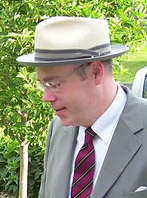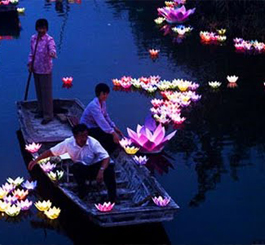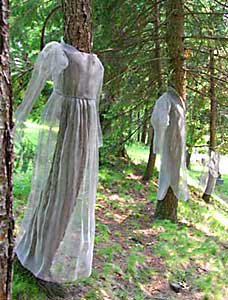Interview with Patrick McNally, undertaker and author of
“The Daily Undertaker”
 When I first came across Patrick McNally’s wonderful blog “The Daily Undertaker” www.dailyundertaker.com, I was amazed at the scope the project. The Daily Undertaker profiles memorial ceremonies, services, and rituals across the world and across time. From ancient Indian traditions to “Twitter Tuesdays”, Irish Wakes to YouTube memorials, Patrick's blog is a fascinating compendium of how we mourn. He writes from both experience and compassion - as an undertaker in a small town south of Madison, Wisconsin, he has seen firsthand many services. I consider his scholarship and articles a true gift, a generous exploration that can open our eyes to the many options available when it comes to memorialization.
When I first came across Patrick McNally’s wonderful blog “The Daily Undertaker” www.dailyundertaker.com, I was amazed at the scope the project. The Daily Undertaker profiles memorial ceremonies, services, and rituals across the world and across time. From ancient Indian traditions to “Twitter Tuesdays”, Irish Wakes to YouTube memorials, Patrick's blog is a fascinating compendium of how we mourn. He writes from both experience and compassion - as an undertaker in a small town south of Madison, Wisconsin, he has seen firsthand many services. I consider his scholarship and articles a true gift, a generous exploration that can open our eyes to the many options available when it comes to memorialization.

Why did you start your blog, The Daily Undertaker?
There is a wonderful variety of ceremonies rituals and practices dealing with death in our world. Some are new, some come from across the world, others we may be familiar with, but have never thought much about. Not only are these practices varied and interesting, they are very important, because they help us, as humans to come to terms with our own mortality and the death of our loved ones. I write the blog to share the importance and richness of these practices with others.
The word “Undertaker” is actually quite beautiful, but it's a word most Americans have come to fear. Why is that?
'Undertaker' originally described a person who undertook to provide funeral services and goods, not someone who takes your body under the ground, and it had a neutral connotation. However, all words that are used to describe things that we are uncomfortable with end up taking on a negative tinge. When we change the word to remove the negative feeling, though, we solve nothing other than confusing people about what we really do. ‘Mortician’ is a fancied-up job title like ‘beautician’ and Funeral Director was the next step after that, but what does that title even mean? To effect a real change we need to talk openly about death, and stop changing the words associated with it. When you say ‘Undertaker’, everyone knows what you are talking about whether they are aware of the origins of the word or not. It's plain talk and yes, plain talk has a real beauty to it.
Is mourning a lost art?
Our culture today is lacking in many of the strengths that Victorian Mourning had, but we enjoy a lot more freedom to choose how we mourn. Both the Victorian model and the model of the 1950’s and 60’s didn't work well for everyone. Today, people feel restricted by mourning and grieving expectations because they are no longer relevant to the lives they lead. My concern is that moving away from rituals and ceremonies that are not relevant should not mean moving away from rituals and ceremonies altogether. What we need is creativity, flexibility and meaning in our death practices.
Are there any funeral rituals of the past you'd like to see revived?
I would like to see more involvement in the physical tasks of dealing with the dead. Specifically, I think that ceremonial washing, carrying and accompanying the dead to their grave or crematory are wonderful opportunities for creative rituals, just as they have been in the past. I would like to see more people view their dead, whether embalmed or not, more walking processions, people staying to watch the casket lowered, and shoveling the dirt themselves.

What can we learn about grieving from other cultures?
The most important thing we gain from looking at the traditions of other cultures, is just how important our own traditions are. I'm not saying that we need to cling to the practices that we were born into, but a cross cultural exploration helps us to see the how the same basic human needs are addressed by many different traditions. This helps us see our own traditions and needs in a new way.
How has the internet changed the way we grieve?
Widespread use of the internet has allowed us to share our own experiences and learn from the experiences of others in a qualitatively different way. The ease of access and broadcast makes this so much easier and faster, and that is the difference - that this exchange actually happens. Not only do we have funeral services online, both web-cast and virtually in Secondlife, Wikispaces or World of Warcraft, we share our thoughts about death, funerals, grief and mourning in a surprisingly candid, albeit brief way on Twitter. There are also many online memorial sites like Tributes.com and InLovingmemory.ir, in addition to defacto memorial sites on Facebook and Myspace. Because of these developments, grieving is becoming more private, but talked about and experienced by many more people. The scope and frequency of this exchange is exposing us more and more to new ideas about the process and about the many many creative options that are available to us.

There are a lot of artists profiled on your site. How can artists help us understand death and loss?
The role that artists play is greatly underestimated by our culture. There is perhaps nothing more important to life than art, because it helps us to find meaning. I find that when I experience a good work of art, I see the world in a different and richer way. Artists take a slice of reality, or a thought, and make it accessible to us in a new way. I recently posted a story about the work of designer Sebastian Errazuriz whose work often deals with issues of mortality. In one of his pieces, An Attempt to Understand a Statistic, he planted 1100 plastic crosses in a New York park, to help us understand what that number, the number of people in NYC who die each day, means. Through artistic expression, we can approach what is overwhelming and unknowable. At Forest Hills Cemetery in Boston, the Historic Trust has embarked on a wonderful project incorporating modern art sculpture into its grounds. Many of the pieces there explore these overwhelming issues of death and what lies beyond it, from Leslie Wilcox' wraithlike night garments that clothe trees, to Caroline Bagenal's luminous floating boats, to Christopher Frost's miniature reproductions of the former homes of the cemetery's residents, each work gives us a new viewpoint on our emotional and spiritual experiences. And just as a smell can carry with it a whole world of memories and feelings, a song or a sculpture or a painting can do the same. When art is brought into the physical and symbolic tasks of carrying, acknowledging and holding our dead and their remains, this quality makes a substantial difference in our experience.

Has grieving become a grassroots movement?
Grieving is not something that is widely encouraged or discussed. Our culture prefers to concentrate on being young and attractive, and mouthing catch phrases. However, this culture is no longer the monolith that it once was perceived to be. Our culture is splitting up more and more into countless non-exclusive niches, and niche influencers. When you look at a phenomenon like memorial tattoos, you see some of these non-exclusive niches. It's not just bikers who get tattoos to memorialize a loved one - often it is a young mother who lost a baby. Grieving practices of the past, such as keeping a lock of hair can show up in very unexpected places. There is certainly a movement out there, but I'm not sure how widespread it will become.
The most unusual funerals you've encountered?
The best funerals come in many forms; some very traditional, some very innovative. What makes a funeral exceptional is the thought and feeling that goes into each part. You can't make a formula out of it, or copy it on to another. It is that experience of having the hair stand up on the back of your neck when the grand daughter plays her flute, or the procession slows down in front of the family farm, or the parish priest chants the same verse that has been chanted forever. What is important is not if it's new or old, but that it is an intentional expression of love and remembrance that resonates with us all. When it's there, you just know it and you feel good.
How do you envision your own funeral?
I envision my own funeral to be a situation where my family and friends feel empowered to creatively share their thoughts and feelings about my life and death. I hope that the reality of my death will be dealt with honestly, that there will be tears as well as laughter, flowers and not memorials, that no one will tell my family that I am in a better place, and that no one needs to play 'Amazing Grace'. You can only imagine how many times I've had to hear that one.







